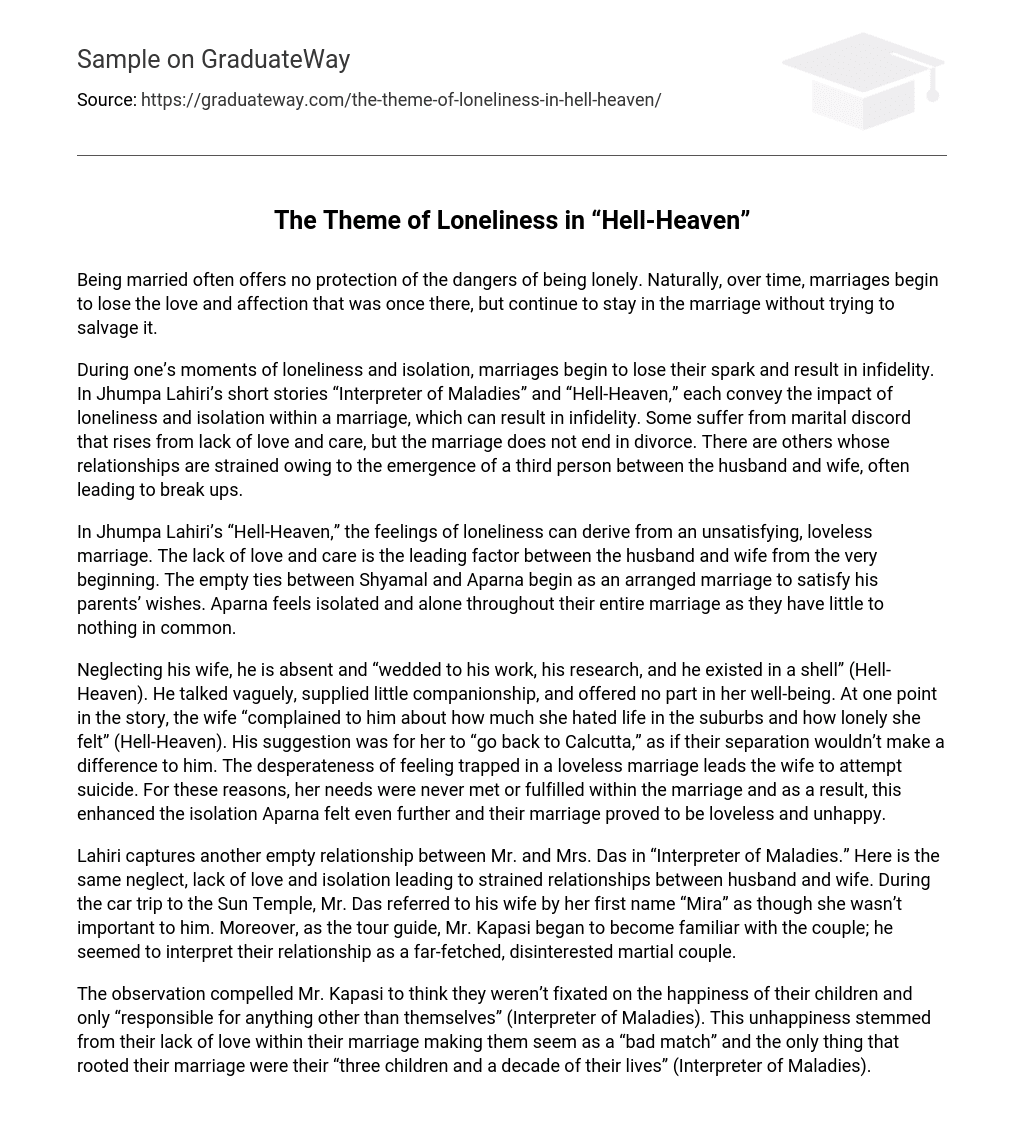Being married often offers no protection of the dangers of being lonely. Naturally, over time, marriages begin to lose the love and affection that was once there, but continue to stay in the marriage without trying to salvage it.
During one’s moments of loneliness and isolation, marriages begin to lose their spark and result in infidelity. In Jhumpa Lahiri’s short stories “Interpreter of Maladies” and “Hell-Heaven,” each convey the impact of loneliness and isolation within a marriage, which can result in infidelity. Some suffer from marital discord that rises from lack of love and care, but the marriage does not end in divorce. There are others whose relationships are strained owing to the emergence of a third person between the husband and wife, often leading to break ups.
In Jhumpa Lahiri’s “Hell-Heaven,” the feelings of loneliness can derive from an unsatisfying, loveless marriage. The lack of love and care is the leading factor between the husband and wife from the very beginning. The empty ties between Shyamal and Aparna begin as an arranged marriage to satisfy his parents’ wishes. Aparna feels isolated and alone throughout their entire marriage as they have little to nothing in common.
Neglecting his wife, he is absent and “wedded to his work, his research, and he existed in a shell” (Hell-Heaven). He talked vaguely, supplied little companionship, and offered no part in her well-being. At one point in the story, the wife “complained to him about how much she hated life in the suburbs and how lonely she felt” (Hell-Heaven). His suggestion was for her to “go back to Calcutta,” as if their separation wouldn’t make a difference to him. The desperateness of feeling trapped in a loveless marriage leads the wife to attempt suicide. For these reasons, her needs were never met or fulfilled within the marriage and as a result, this enhanced the isolation Aparna felt even further and their marriage proved to be loveless and unhappy.
Lahiri captures another empty relationship between Mr. and Mrs. Das in “Interpreter of Maladies.” Here is the same neglect, lack of love and isolation leading to strained relationships between husband and wife. During the car trip to the Sun Temple, Mr. Das referred to his wife by her first name “Mira” as though she wasn’t important to him. Moreover, as the tour guide, Mr. Kapasi began to become familiar with the couple; he seemed to interpret their relationship as a far-fetched, disinterested martial couple.
The observation compelled Mr. Kapasi to think they weren’t fixated on the happiness of their children and only “responsible for anything other than themselves” (Interpreter of Maladies). This unhappiness stemmed from their lack of love within their marriage making them seem as a “bad match” and the only thing that rooted their marriage were their “three children and a decade of their lives” (Interpreter of Maladies).
This example shows the lack of morality they had for one another. Secondly, Mr. Das’ lack of love towards his children is exemplified when Bobby is put into danger when the monkeys attack him. In this case, it should’ve been Mr. Das, but because of his lack of compassion towards his own son. Mr. Kapasi saves Bobby from the monkeys instead proving the lack of relationship between son and father.
Moreover, in the story “Hell-Heaven” Lahiri exerts the feelings of loneliness and unsatisfied closeness are often important factors that lead a person to commit infidelity. Pranab Kaku supplied the emotional need that Aparna’s husband failed to provide. He opened a part of her heart that became a stepping-stone into “the only pure happiness she ever felt” (Hell-Heaven). He filled a sort of void that couldn’t be filled by her husband’s presence.
She seemed to look forward to his visits and “was in foul humor on days he didn’t materialize” (Hell-Heaven). Once Deborah was introduced to Pranab Kaku’s life, Aparna blamed her for taking him away from her. Although, infidelity never occurred between them, there was an unspoken feeling that became a disloyal factor on her part of the marriage. Interestingly, Shyamal was not even slightly jealous of Pranab’s frequent visits and was seemingly “grateful for the companionship he provided” (Hell-Heaven).





